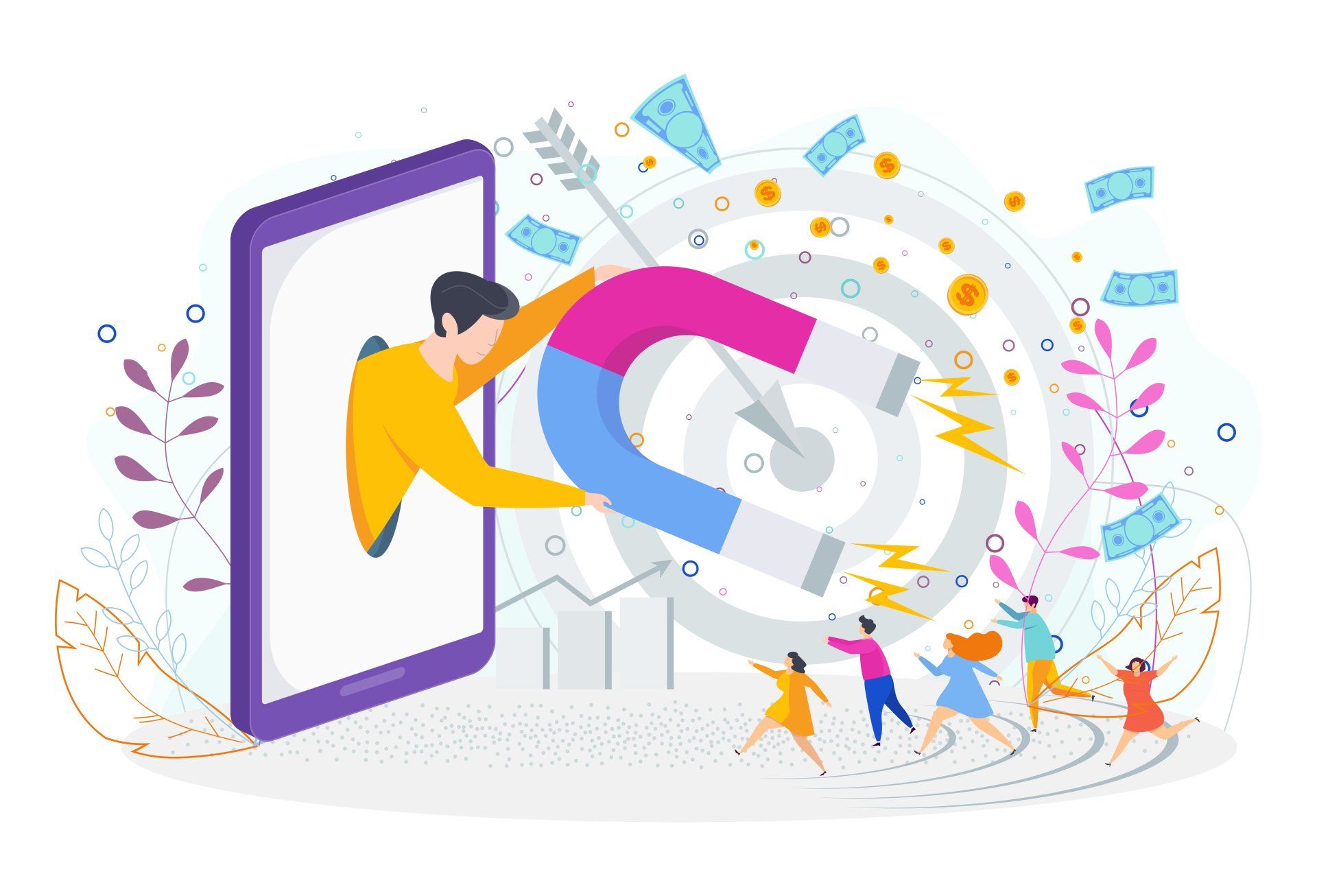Why your business needs to offer lead magnets
Cotswold Web • 20 May 2020
A lead magnet is a unique piece of content you offer to visitors to your website in return for their contact details.
Few people can resist something extra for free – it’s called a ‘magnet’ because it attracts
people.

We’ve written more here about some of the different types of lead magnets you could offer, but it could be anything from an ebook to bonus video content or a downloadable checklist.
Whatever form they take, lead magnets usually have two things in common. The first is that you will need to put a bit of time or effort into producing them (even if that’s just repackaging an existing blogpost), so that visitors know they are getting something unique.
People are unlikely to give you their email address if they can find the content elsewhere without giving you their contact details.
The second is that lead magnets go beyond simply selling your products and services – they are about giving visitors useful information, whether or not they go on to buy from you.
From the point of view of your readers, a lead magnet is added value with no strings attached.
What’s not to love?
Why you need lead magnets
When you consider your content strategy, including your blog and social media, you should also think about lead magnets. Because lead magnets can make a really valuable contribution to your conversions.
Lead magnets drive conversions, full stop.
The whole point is to get contact details from website visitors, so that they go from unknown visitors to known leads and potential customers.
By signing up for a lead magnet, a person is showing that they are interested in what you have to say and want to find out more.
If your lead magnets are of interest to your audience, they can help turn leads into regular customers who are loyal to your brand.
If you are knowledgeable about a particular subject, a lead magnet - whether an ebook, video or something else - allows you to go into the subject in more depth. Every blogpost you write should contribute something – whether that is answering questions from customers or commenting on issues in your industry or the news agenda.
But a lead magnet goes much further than a blogpost can. It isn’t restricted to 1000 words and allows you to share more of your expertise, giving something valuable to your readers, which they can’t get anywhere else.
How lead magnets encourage conversion
Just signing up for a lead magnet is the first step towards conversion – converting readers into leads and ultimately into paying customers. But it goes further and helps put you at the front of a potential customer’s mind.
When people start researching a subject or looking for a particular product online, they will usually search a phrase, then open a number of sites, have a quick read through, and shut them down again. They might be learning something, but they aren’t building a connection with a particular site or brand.
But when you send them a lead magnet, you are sending them something which meets their needs and answers more of their questions in an easily digestible format.
This will make your business more memorable. It becomes the one they build a connection with – and the one they are most likely to buy from.
As a business, the most important benefit of a lead magnet is that you get valuable contact information. The aim is always to get a person’s primary email address. Many people will have multiple email addresses, some of which they don’t use. But if they want to receive something from you, they are far more likely to give you their main email address.
While some companies advise offering a lead magnet as a download immediately in return for an email address, we would advise you being a bit cleverer than that.
Make sure you actually email out a link containing the lead magnet, rather than offering it immediately. That way, visitors will have to give you a genuine email address, in return for the lead magnet.
Make it work
To get that valuable contact information, you need people to want your lead magnet. The whole point of a lead magnet is not to give too much away initially, but you have to reveal enough detail to make it something people will actually want.
So whether it is an ebook, a checklist or a piece of video, you need to write a title that will get people excited.
People have short attention spans and that goes for titles too. Apparently they only really notice the first three and last three words in a title – so those need to be the most important ones.
This isn’t the place for puns or clever headlines, just tell them exactly what your lead magnet is about
eg 15 LinkedIn secrets that will work for you or 10 top SEO tips for small businesses.
Alternatively, use How to
in the title. This makes it clear exactly what problem you are going to solve eg How to get your garden ready for summer
and promises useful information that the reader will be able to use straightaway.
If you are confident that your lead magnet has all the answers anyone could possibly need, make a bold claim in your headline using The ultimate guide
eg The Ultimate guide to keyword research for SEO.
Spread the word
Although you don’t want people to share your lead magnets in the same way they would your blog links (because then people could get them ‘free’ without giving you their email address) – you can still encourage your leads to spread the word.
Once a visitor has given you their contact details for the lead magnet, they should be redirected to a page thanking them for their information. This is a great place to suggest they share something on social media
eg ‘I’ve just downloaded Tewkesbury Garden Centre’s ebook Making the most of your garden all year round, click here to find out more’. Include social media sharing icons
eg Facebook, Twitter and LinkedIn, and a link to your landing page, so that their followers have the opportunity to sign up for the lead magnet too.
You can also add another opportunity to share to social media after reading or viewing, with a call to action
like: ‘If you think this ebook would be useful to others, we would love you to share it with your followers’. Again, include a link to the landing page and social media sharing icons.
Alternatively, you can encourage people to share your lead magnets directly on social media, but using the Link Lock tool. Anyone who clicks on the link in social media will be able to see an impression of the lead magnet, below the Link Lock opt-in tool, but will need to give their email address before they are actually able to unlock and read or view it.
Creating lead magnets takes a little bit of time, but the potential gains are well worth the additional effort.
By putting that extra work in and creating something of value to your audience, you will be able to increase your email contact list to help keep building your business.
More Posts.

In today's digital landscape, effective content marketing can be the key differentiator for small businesses striving to stand out. As consumers increasingly turn to online platforms for information, brands must engage their audiences through valuable content that resonates with their needs. Understanding the nuances of content marketing is crucial; it encompasses various strategies designed to attract, inform, and delight customers while ultimately driving sales. From developing engaging customer personas to measuring success through specific metrics, small businesses have an incredible opportunity to refine their marketing approach. This article explores eight proven strategies that can lead to content marketing success for small businesses, equipping you with the tools necessary to create impactful and sustainable marketing efforts. 1. Understanding the Importance of Content Marketing Content marketing is vital for small businesses. It helps connect them with their target audience, builds brand awareness, and drives organic traffic. A well thought out content marketing strategy lets small businesses compete with larger companies by using cost effective methods. Regularly sharing valuable content can position a business as an expert in its field. This fosters trust and encourages potential customers to seek their services. Documenting your content strategy also increases the chances of seeing your marketing efforts as effective, allowing a higher allocation of budget toward content marketing. Creating a diverse range of content types is key. Here are some content formats to consider: Blog Posts Social Media Posts Email Marketing Visual Content Developing a strategic content plan helps business owners carve out unique market spaces. Establishing clear business goals and using tools like Google Analytics to gauge conversion rates can refine your approach. Below is a quick checklist for effective content marketing: Know your target audience Set SMART goals Use a content calendar Perform a content audit By focusing on these elements, small businesses can enhance their content marketing efforts and achieve growth. 2. Developing Customer Personas for Targeted Engagement To create targeted content, small business owners should develop detailed buyer personas. These personas are fictional versions of ideal customers, including demographic and psychographic details. Tools like Google Analytics and social media insights provide valuable data to shape these personas, making them more accurate. Understanding your target audience through buyer personas is key. It allows content marketers to tailor pieces of content that address specific needs and challenges. This approach boosts engagement and builds trust with potential customers. It is often necessary to have multiple personas to cater to various products, services, or customer segments. Each persona reflects different motivations and interactions with your brand at various stages of the customer journey. Here's how you can develop them: Collect Data: Use surveys, Google Analytics, and social media insights. Analyse: Determine the needs, interests, and behaviours of your audience. Create Multiple Personas: Define different segments based on your findings. Tailor Content: Use the personas to guide your content marketing efforts. Effective personas lead to a successful content marketing strategy, enhancing your business goals with every piece of content created. 3. Crafting a Comprehensive Content Plan Creating a successful content plan is key for small business owners. It acts as a guide to align all your content marketing efforts with your business goals. Here’s how you can craft a comprehensive content plan: Identify Key Topic Areas: Focus on subjects relevant to your target audience. This ensures you create valuable content that speaks directly to potential customers. Choose Content Types: Use a mix of blog posts, infographics, and videos. Different content formats can help engage various segments of your market. Plan Distribution Channels: Decide where to share your content. Consider social media posts, email marketing, and your website for maximum reach. Set Calls to Action: Encourage your audience to take the next step. This could be signing up for a newsletter or visiting a product page. Utilise a Content Calendar: This keeps your content marketing strategy organised and consistent, minimising missed opportunities. Analyse Metrics: Use Google Analytics to track conversion rates, engagement, and content performance. Including these elements in your content plan aligns with the fact that structured strategies significantly boost success rates. Regular content audits refine this strategy further, ensuring continued engagement and growth .

Heading 1 Artificial intelligence (AI) has had a huge impact in many areas of life and SEO is no exception. While it has made online searches easier for consumers, keeping up with it and staying ahead as a business can be challenging. As Google integrates advanced AI into its search results, businesses must rethink their SEO strategies. Understanding the future of SEO in the context of AI is essential to appear high on search rankings and remain competitive. Traditionally, search engine optimisation (SEO) has relied largely on keyword optimisation and link building. If you sell garden products, you would make sure the phrase ‘garden products’ was used frequently throughout your website. You would also look to get some links back to your site from other websites – maybe other businesses in your local area or in a complementary sector. These traditional SEO methods are becoming less effective. AI means search engines like Google and Bing have become better at understanding the intent behind a search, through machine learning algorithms analysing huge quantities of data, as well as natural language processing. Natural language processing doesn’t just understand the words in a query, it understands the context and intent behind it. AI can even understand synonyms, slang and regional variation in language! When someone searches for something online, AI can analyse, interpret and predict their behaviour. So businesses have to adapt their SEO strategies to changing algorithms to stay competitive. You need to have a deeper understanding of your target audience and produce content which meets their needs and answers their queries. It is about providing the best answer to the questions your audience is asking, because AI algorithms are skilled at recognising content which meets the search intent of users and provides value. This means that content which is designed to meet specific needs, answer questions and provide the solutions to problems is more likely to rank higher in searches. AI algorithms will prioritise content which resonates with users on a human level – with every paragraph adding more value and depth. This aligns with AI’s preference for content which engages and informs – and also helps build a stronger connection with your target audience. In addition, AI is making voice searches (e.g. Alexa) much more effective. Voice searches tend to use more words than online searches e.g. ‘find me healthy snacks for pre-school children’ rather than just typing ‘healthy snacks’ into Google with no context. This aspect of AI will continue to grow in importance and become even more widely used.





